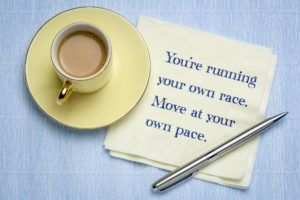 “Rats are clever, quick thinkers, and successful, but content with living a quiet and peaceful life.” That’s from the Chinese New Year Zodiac, which could be trying to burnish the rodent’s reputation in this Chinese Year of the Rat that began the end of January.
“Rats are clever, quick thinkers, and successful, but content with living a quiet and peaceful life.” That’s from the Chinese New Year Zodiac, which could be trying to burnish the rodent’s reputation in this Chinese Year of the Rat that began the end of January.
But that begs the question: If rats lead such a docile existence, why are so many of us humans running in a “rat race”?
The rat race idiom is almost a century old, originating in the United States in the 1930s, according to The Grammarist. The reference is unclear. Some think it might be related to the practice of scientifically testing rats in laboratories in which they often have to run through a maze to get a reward. Or, the term could come from sporting events in the 1800s which featured rats racing one another.
Fast forward to today. While more of us are shunning intense competition for more collaboration, many of us are still running our body, including our brain, on overload. You can do this for short bursts, a la sprints, but this behavior is not sustainable for a long journey. Without enough sleep, exercise, and a healthy diet, you can seriously damage yourself. Plus, high levels of continued stress can create problems for your long-term wellbeing as well.
If you feel like you could be running in a rat race or on a hamster wheel, how do you break out? The answers are different for each individual.
However, a good place to start is to recognize that you want to disrupt your current pattern. For example, your health may be at risk. Or you may be dissatisfied with how you’re living your life. It may not be work; sometimes everyday living can be just as or more taxing than working, especially if you love your job. Whatever, you want to make a change.
Next, take some time to reflect. Find a few minutes to ask yourself this question: What’s giving me energy these days, and what’s depleting me?
Answering this question may give you insights that you can act on and make a positive impact on your life. These three examples provide you with some ideas.
When I asked one of my coaching clients this question, he immediately responded that he was spending too much time in meetings, many unproductive for him but important enough for his team to be represented. They needed to know what was going on as well as have their voice at the table.
We talked about a way to evaluate which meetings were worthwhile for him, and which he could delegate to members of his team as a development tool for them to grow.
For the next couple of weeks, he tracked all the meetings he attended and color-coded them by type. As he looked at his calendar, he saw that two types of meetings were more suitable for his direct reports to participate in. He worked with them to rebalance their work and take on these meetings. My client is now using his newly freed up time on strategic projects and plans.
Another client deferred answering the question about energy givers and takers. She opted to find a few minutes one morning before she started her workday to think about her response. In about 10 minutes she created a helpful list for herself.
One of her key insights was that many of her energy drainers were things in her control. Over the next few days she started redesigning her routines and some of her individual work processes. As a result, she’s feeling less stressed and more in charge of her schedule and life, both work and personal.
After mulling over this question about energy boosting and draining, another coaching client had a totally different insight. She acknowledged that she likes being busy. It makes her feel important and necessary.
Upon further inquiry and reflection, she realized that she was spending time on activities that weren’t connected to her goals, her values, or her interests. After confirming her priorities, she’s switched her calendar all around. She’s still “busy” yet she’s now spending her time and energy on things that matter to her.
What’s the one big lesson you can draw from these examples?
Mine is that we need to pause every now and then – maybe at least once a quarter or even more often – to reflect. Otherwise, it’s too easy to find yourself sleepwalking through life and doing things that you really don’t want or need to do. Furthermore, these tasks may be exhausting you with minimal or no positive benefits.
Rather than sleepwalk, which can turn into a rat race that hurts your health, wake yourself up. Think about how you can use the 24 hours each of us has each day to best help yourself.
And if you need or want a coach to help you, lots of us are available. If you’re interested in talking with me, email me first.

0 Comments